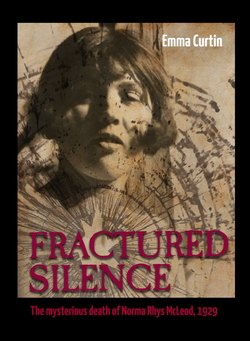Читать книгу Fractured Silence - Emma Curtin - Страница 12
На сайте Литреса книга снята с продажи.
____________________
ОглавлениеWhile apparently no one at Norma’s bedside on that Monday afternoon actually discussed what had caused Norma’s loss of consciousness, the initial ‘unspoken’ impression, according to Norma’s father, Major Norman McLeod, was that she’d had some sort of accident.
What was immediately visible when Norma was examined on her bed was a black eye, but no apparent cuts to the skin or external bleeding.
So when the tragedy was first reported to police headquarters by Dr Thwaites, it was thought that Norma had probably fainted while in the bathroom. Had Norma struck her head on the bath or on an old-fashioned marble-topped table that was in the bathroom? This was certainly the opinion offered to the press by Norma’s brother, Rhys, with one journalist reporting: “he personally held the theory that his sister had fallen when about to have a bath, and had struck her head”.
The Herald reported that a stranger, who had given his name and address to Major McLeod, had suggested that injury might have been caused by “a bedroom window suddenly descending on Miss McLeod’s head”. Who that stranger was, we’ll never know, but it seems like an odd thing to suggest – certainly not the first thing that would come to my mind - and the idea was soon dismissed. The McLeods’ neighbour Miss Gwilliam, the nurse who’d come to help Edith McLeod, stated that the windows were closed at the bottom and the sash cords intact, so that “neither of the windows could have moved without independent agency”.
The accident theory was initially accepted by both the press and the public, some not letting it go easily, even when challenged by the evidence (which we’ll get to). Maybe the ‘alternative’ was too horrible to contemplate, especially in such an affluent suburb and, more alarmingly for the McLeods’ neighbours, within the family home. You only have to think about all the publicity today about a recent rise in home invasions to know how unpalatable that idea is.
Out of the thirty letters sent to police, thirteen included some kind of accidental death theory. Some included stories of the writer’s own accidents, intended to ‘explain’ what might have happened to Norma.
Like the McLeods, many of the writers came from wealthy suburbs and, perhaps for their own peace of mind, wanted to put down on paper more ‘comfortable’ suggestions that didn’t involve an attack by a terrifying stranger. Agnes Truman of Elsternwick wrote, “… the circumstances surrounding the death are so strange and no doubt it would be a great comfort to the bereaved relatives if the theory of accident could be established”. Others were more determined to dismiss anything sinister, and wrote to contradict “exaggerated details of murder of Miss Macleod (sic)”, or believing “it is impossible to see murder in this case, as far as I can view it”.
Many of the letter writers didn’t provide their names, signing off instead with statements of good will, as if performing a community service. These included: “Trusting this experience may be a clue to such dreadful consequences” or “I venture to bring it to your notice as worthy of investigation”, or simply, “Wishing to help”.
I’ve already mentioned that the idea of ‘helping’ the police directly was nothing new. Melbourne’s Punch, which was so keen to highlight the importance of the press in police work back in 1911, also stated: “profoundly as we may trust the skill and judgement of the police, this country will soon become the criminals’ paradise if the detectives and the police are to be left to their own unaided efforts to clear up crime”.
As I sat reading these letters, I wondered whether they were helpful to the police in Norma’s case, or just a nuisance. There’s no doubt some are almost laughable, even if they were written with good intentions, and it doesn’t take too big a stretch of the imagination to think of the detectives rolling their eyes or passing them around the office as a shared joke. But could the police simply ignore them? Did they follow up? When return addresses were supplied, polite acknowledgements were sent by the police to the letter writers (copies of those responses were kept in the file). But did they do more? I was still months away from investigating the investigators, so I parked those questions. For now I was focused on the contents of these ‘accident theory’ letters. Let’s have a closer look.
